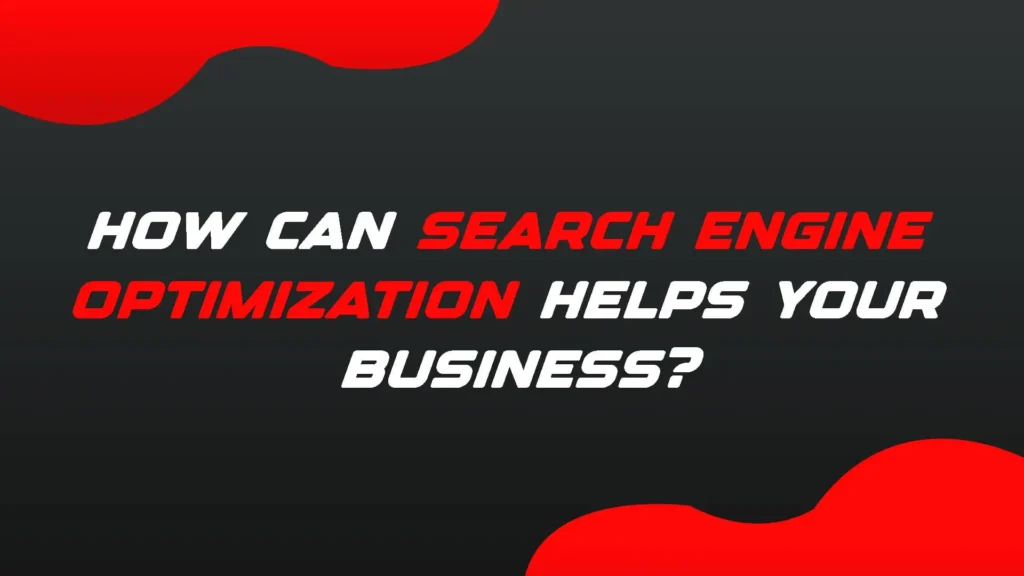Businesses simply cannot afford to ignore SEO in today’s digital world, as consumers rely significantly on search engines to find goods and services. Businesses can ensure that they stay relevant and accessible in an oversaturated online marketplace by investing in a complete SEO plan.
We promise you that this blog would be sufficient for you to know “How can SEO help your business?”
But first I would like to address the most basic questions about this subject.
Let’s get into it.
Table of Contents
ToggleIntroduction:
SEO, or search engine optimization, is an essential part of every efficient digital marketing plan. SEO helps businesses enhance their exposure and generate more traffic from search engines like Google, Bing, and Yahoo in today’s online landscape, where millions of websites fight for attention.
SEO is the practice of improving a website’s content, structure, and design to improve its ranking on search engine results pages (SERPs). Businesses may enhance their search ranks and eventually drive more organic traffic to their site by combining on-page SEO techniques such as keyword research, content optimization, and metadata optimization with off-page measures such as link building and social media involvement.
SEO has various advantages for businesses. Businesses may boost their visibility, create more prospects, and eventually drive more revenue by ranking at the top of search results. Furthermore, SEO can assist firms in establishing trustworthiness and standing in their market, as well as increasing customer recognition and retention.
How can SEO help your business ?

SEO helps businesses in various ways like:
1. Improved search engine visibility:
If your company does not show on the top page of search engine results pages (SERPs), potential clients may never find you. SEO raises your website’s prominence in search results for relevant terms, increasing your visibility to potential clients. For example, if you own a plumbing company in New Delhi, you want to be on the top page of search results for terms like “plumber in New Delhi” or “emergency plumbing in New Delhi.”
2. More targeted traffic:
Because SEO focuses on certain keywords linked to your business, the audience it generates is more likely to be interested in your products or services. This can result in increased conversion rates and, as a result, more income. For example, if you sell organic skincare products, you want to attract customers who are searching for terms like “organic skincare” or “natural face moisturizer.”
3. Enhanced credibility:
Being on the top page of search results for a specific keyword can aid in the development of credibility and trust with potential clients. Consumers are more likely to trust firms at the top of search results than those on the second or third page. For example, if you’re a financial adviser, appearing at the top of search results for terms like “financial advisor near me” or “best financial advisor in my area” might help you establish yourself as a reliable authority in your profession.
4. Competitive advantage:
If your competitors aren’t investing in SEO, ranking higher in search results can give you a competitive advantage. Even if they are investing in SEO, a great approach can help you surpass them and gain a larger part of the market. If you’re a tiny online retailer competing against larger enterprises, for example, a solid SEO strategy can help you appear higher in search results for specific keywords and attract more customers.
5. Long-term advantages:
SEO is a long-term approach that can produce results months or even years after the first investment. In contrast to other marketing tactics that necessitate continual investment, a well-optimized website may continue to attract targeted traffic, generate prospects, and produce cash for years to come.
6. Cost-effective:
SEO is quite inexpensive when compared to other marketing tactics, especially when considering the long-term benefits. While optimizing your website and creating content requires an initial investment, the continuing expenditures are often lower than other techniques such as paid advertising or email marketing.
7. Improved conversion rates:
Because SEO focuses on particular keywords, the traffic generated by it is more likely to convert into leads and customers. This is because customers who are looking for certain items or services are more likely to buy them. If you’re a real estate agent, for example, targeting phrases like “homes for sale in my neighborhood” or “real estate agent near me” will help you reach people who are actively searching to purchase or sell a home.
8. Better user experience:
SEO entails refining the structure and content of your website to improve the user experience, which may lead to more engagement and decreased bounce rates. Making your website mobile-friendly, improving site performance, and generating high-quality content that answers customers’ concerns and delivers value are all examples of this. When visitors have a great experience on your website, they are more likely to remain longer, visit more pages, and finally become customers.
9. A better understanding of your audience:
SEO entails performing keyword research to learn what your potential clients are searching for online, which may help you better understand their wants and preferences. This may assist you in creating content that connects with your target audience and establishes your company as an authority in your industry or area.
10. Targets particular audiences:
Focusing on the individuals who are most likely to be interested in your products or services is what targeting specific audiences entail. This might include individuals in a certain geographic area, people with specific hobbies or demographics, or those who have already expressed interest in your products or services. SEO enables businesses to target certain audiences, improving the possibility of those visits turning into customers.
11. Improves website authority:
SEO may assist improve the relevance and credibility of your website in the eyes of search engines and users. Website authority is a factor in search engine ranking algorithms, and having a higher authority can result in higher search engine ranks and more exposure in search engine results pages (SERPs). Your website develops authority and becomes a more trustworthy source of information for potential clients by ranking higher in SERPs.
12. Increases local search results:
Local SEO is a subset of SEO that focuses on optimizing a website’s content and structure to boost its ranking in searches for local companies, services, or items. SEO may assist boost local search results for businesses that rely on local consumers, making it simpler for local customers to locate them.
13. Improves mobile visibility:
Search engine optimization (SEO) can help increase a website’s visibility and rating in mobile search engine results pages (SERPs). With more people searching the internet using mobile devices, SEO may assist increase your website’s mobile visibility, ensuring that your website is available to a larger audience.
14. Improves social media presence:
SEO may assist to improve website content, making it more shareable on social media. By incorporating social sharing buttons on a website, readers can simply share material on their social media accounts, extending the reach of the website’s content and bringing traffic back to the site. SEO may help you improve your social media presence by making it simpler for potential consumers to locate your social media pages.
15. Enhances website usability:
Search engine optimization (SEO) and website usability are inextricably linked since both strive to provide a great user experience for website visitors. A user-friendly and easy-to-navigate website not only enhances the user experience, but may also aid in SEO by lowering bounce rates, improving user engagement, and attracting more traffic. SEO is improving the style and structure of your website to make it easier for people to browse and find the information they require.
16. Builds trust:
Search engine optimization (SEO) may help build trust with website visitors and potential consumers by increasing a website’s visibility and trustworthiness in search engine results pages (SERPs). Your company may develop trust with potential consumers by ranking better in SERPs and offering high-quality content.
17. Offers significant information:
Search engine optimization (SEO) may offer valuable insights about the performance and user behavior of a website. Businesses may obtain a better knowledge of their audience, find areas for development, and make data-driven choices by monitoring and analyzing SEO data. SEO data may reveal where website traffic originates, such as search engines, social media, or referral channels.
Conclusion:
Search engine optimization (SEO) may benefit organizations in a variety of ways, including increased website traffic and visibility, as well as improved brand reputation and customer interactions. Businesses may enhance their positions in search results and attract more relevant traffic to their website by optimizing their website content and structure for search engines. This enhanced visibility has the potential to generate more leads and conversions, resulting in higher revenue and business growth.
SEO can assist organizations to build brand credibility and long-term consumer relationships in addition to boosting traffic and income. Businesses may build a loyal client base and a strong brand reputation by offering valuable content, giving a positive user experience, and establishing trust through higher search ranks.
Ultimately, SEO is an effective marketing technique that may assist organizations in improving their internet presence and achieving their company objectives. Businesses may remain ahead of the competition and efficiently reach their target audience by investing in SEO tactics.
FAQs:
Q1. How can SEO benefit businesses?
SEO may assist organizations in increasing website traffic and exposure, building long-term client connections, and ultimately driving more leads and conversions.
Q2. What are some SEO tactics?
Keyword research, on-page optimization, link building, content production, mobile optimization, and user experience (UX) design are some SEO tactics.
Q3. How long does it take for SEO to deliver outcomes?
SEO is a long-term approach with variable outcomes dependent on factors such as competition, industry, and website structure. In general, major gains in search results and traffic might take many months.


